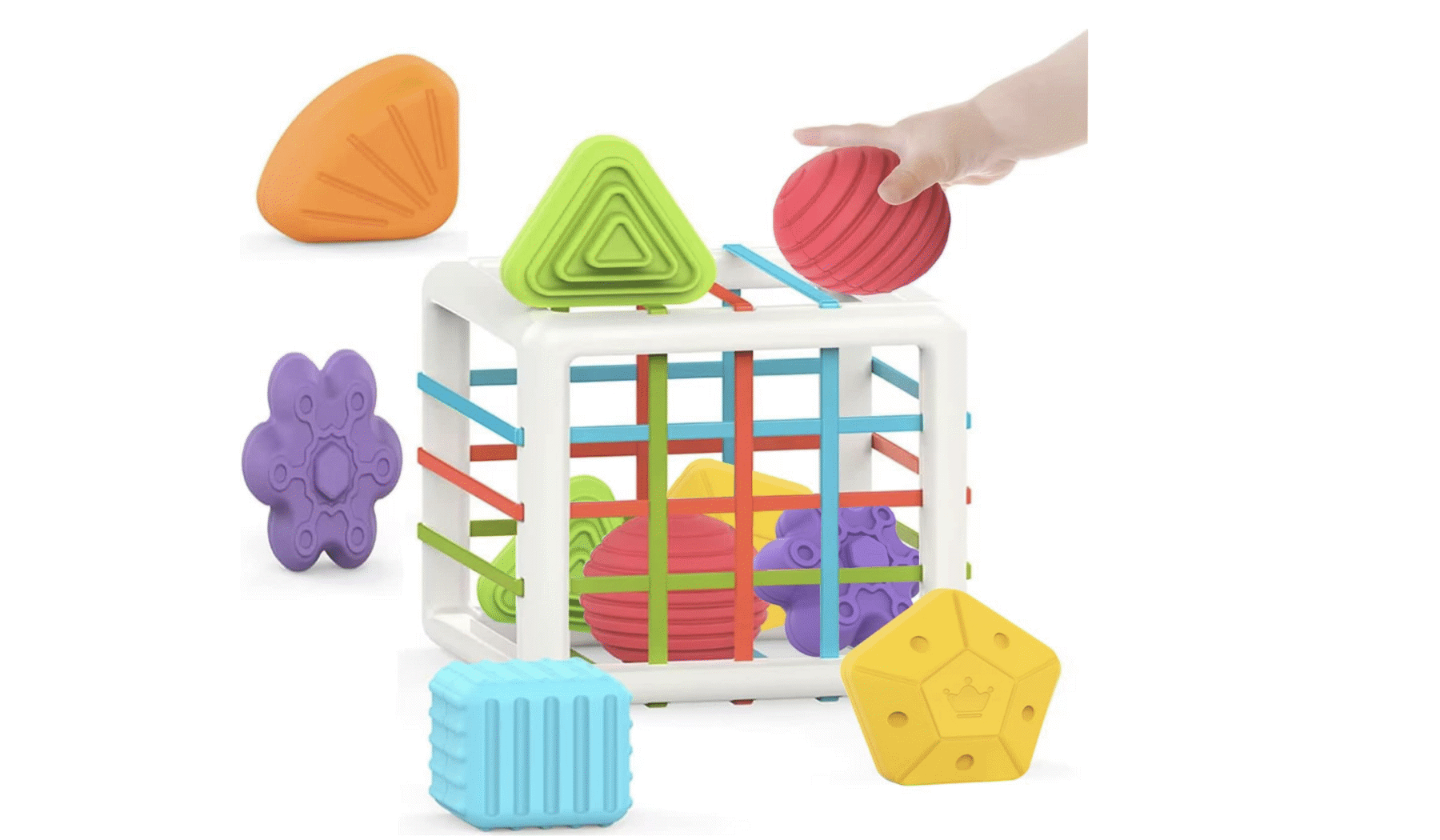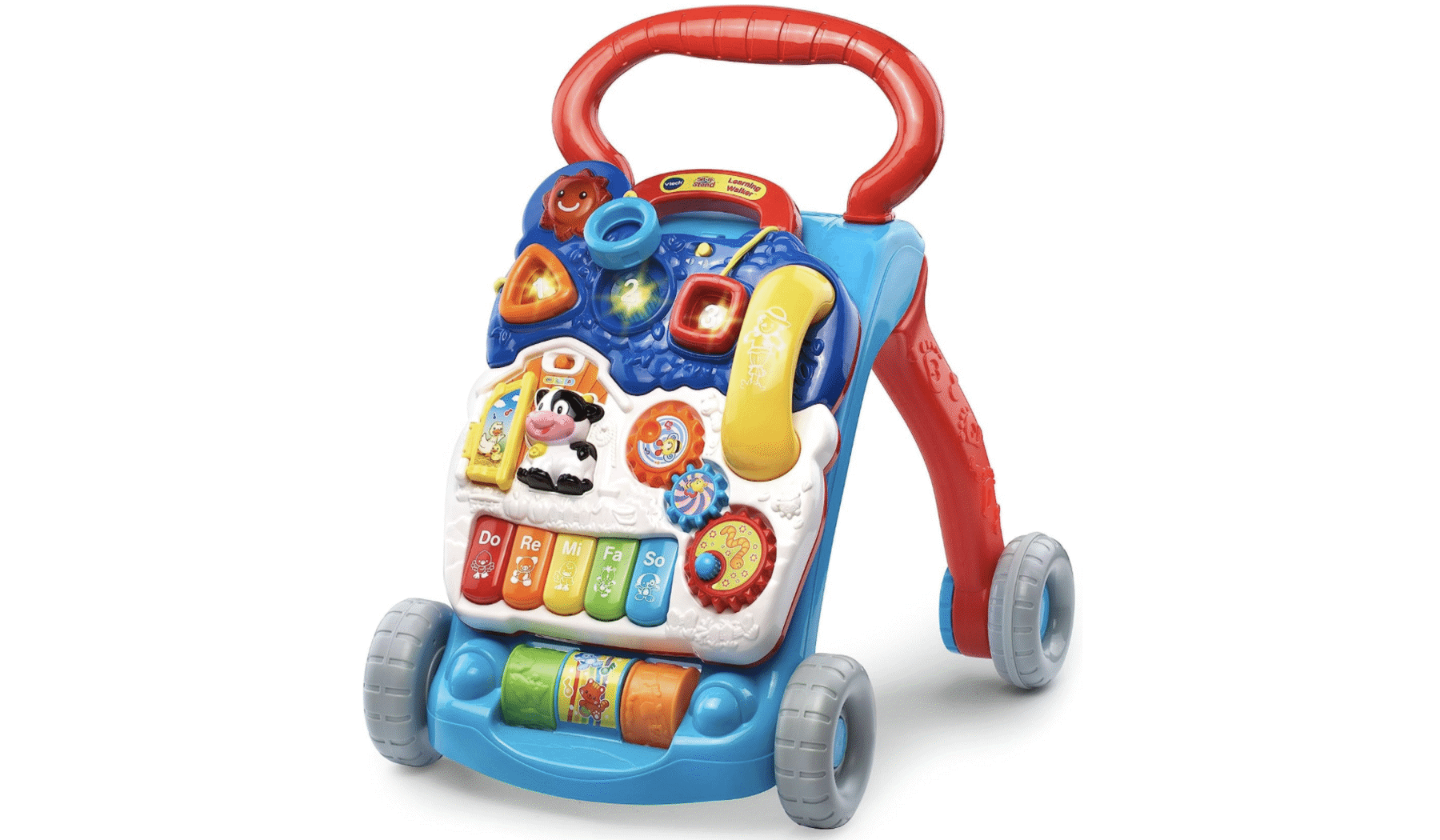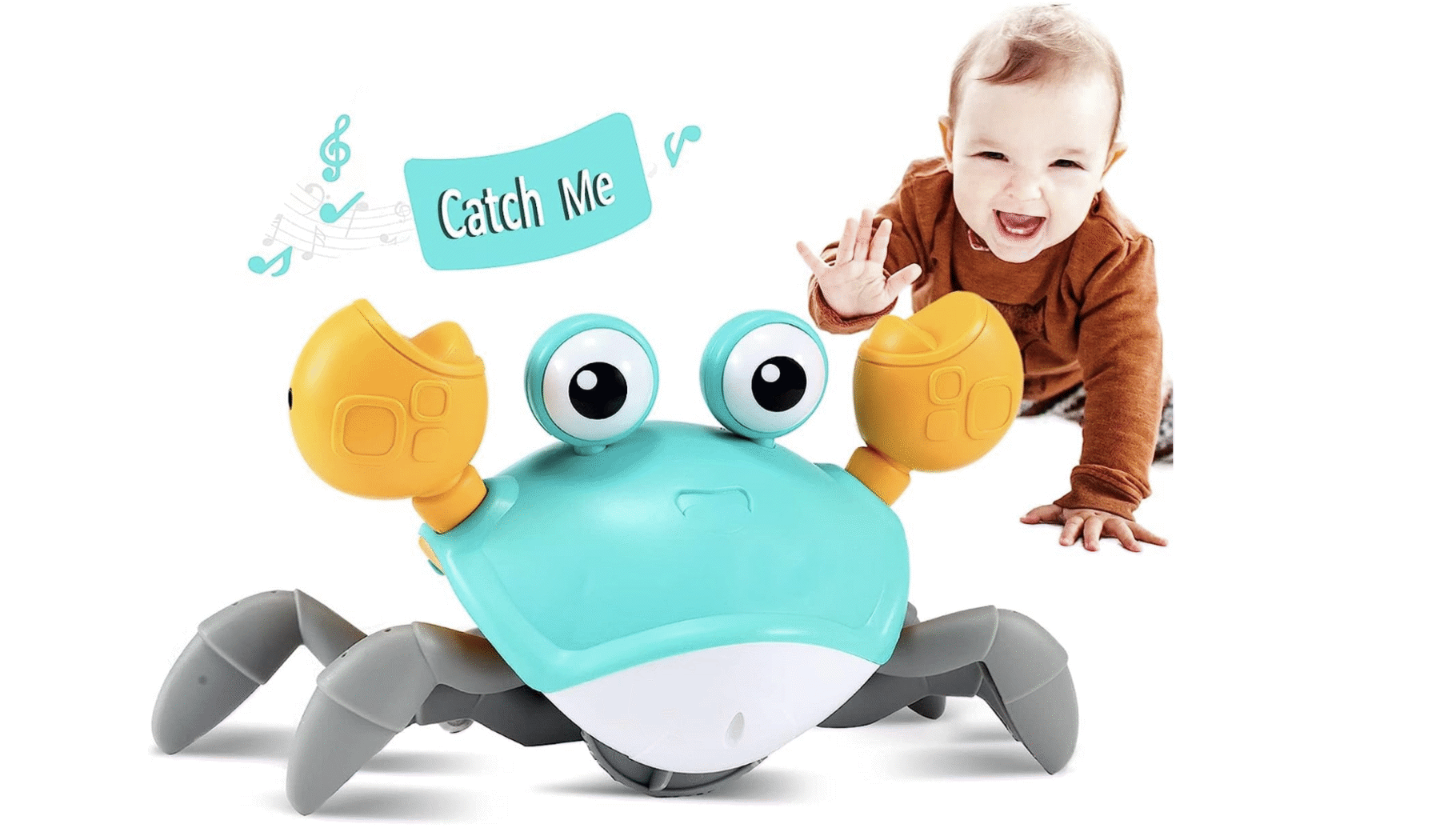9-Month-Old
This week, there are many milestones you can expect your baby to have reached by now, including using a pincer grasp. A pincer grasp means your little one will use their thumbs and index fingers to help grip objects. This is an important skill for babies to master and will help your little one hold things like a sippy cup, toys, and, soon enough, eating utensils!
Fine motor development involves the coordination of small muscles, particularly in the hands and fingers, allowing your baby to explore the world through touch and develop hand-eye coordination.
They're often referred to as "hand and finger skills." As your little one ages, these skills are essential for actions like tying shoelaces, buttoning up clothes, and eventually learning to write.
At this stage, one of the most exciting developments relating to fine motor skills is the discovery of the pincer grip. You may have noticed your baby's fingers becoming more coordinated and precise in recent weeks. This newfound skill enables them to pick up tiny objects using their thumb and forefinger, much like a tiny pincer or crab! It's a significant step in their journey toward independence, and you’ll likely notice a jump in their self-feeding skills once they master this grip.
In line with improving their gripping skills, your baby’s fascination with opening and closing things likely knows no bounds! Whether it's a simple flap on a board book or a toy with doors that swing open, they are easily captivated by this repetitive action for what feels like hours.
This simple-seeming activity keeps them entertained and plays a vital role in fine motor skill development. It helps them refine their hand-eye coordination and fine-tune their finger muscles.
Toys that encourage this type of exploration are great for their fine motor development. Consider introducing toys such as shape sorters, stackers, building blocks, and cups that nest within each other. As they manipulate each shape to fit it into its designated slot, they learn about shapes, improve hand-eye coordination and problem-solving skills, and build hand strength.
As your little one continues to grow and explore the world of weaning, you might notice some exciting changes in their eating habits. By this month, you may have noticed that your baby is gradually reducing their milk consumption. This is perfectly normal! As they become more curious about the world of solids, they might favor meal times over milk feeds. It's a promising sign that they are on the path to becoming a little foodie!
Feeding time will become more of an independent activity for your little one now that they can hold things on their own. Many babies start holding their own bottles once they are able to. Soon enough, bottles will turn into sippy cups, and fistfuls of food will turn into spoonfuls.
Of the 700-900 calories your nine-month-old consumes daily, half should still be coming from breast milk or formula. Now is a great time to encourage your little one to use their sippy cup and drink water from it. Once they get the hang of drinking water from their sippy cup, slowly transition to feeding your baby milk from a sippy cup as well if you are planning to eliminate breastfeeding anytime soon.
Until now, you have provided your child with their milk food before experimenting with solid foods to ensure they got all their nutrients first. This week, you might begin offering real food to your baby first, then follow up with breast milk or formula afterward. Continue to provide your baby with foods that vary in color, taste, and texture throughout this process to expand their palette and prevent them from becoming a picky eater.
As their eating habits change, one important thing to remember is that there are no strict rules about how much or how little solid food your baby should eat at this stage. Each baby is different, and their appetites can vary daily. Some days, they may devour every spoonful or piece of food you offer, while other days, they may only take a few bites.
Trust your little one's cues, and don't pressure them to eat more than they want.
In addition to their milk feeds, you should offer your little one three meals daily. Breakfast, lunch, and dinner each day will give your little one multiple opportunities to eat and try new foods. These meals should form the foundation of their daily nourishment, giving them various food groups.
If you have a particularly hungry baby, you might feel like offering them a snack between meals; however, babies younger than 12 months do not need snacks. If your little one seems hungry between meals, offer them breast milk or formula to help tide them over.
Watching your little one grow and mature by the day can stir up your emotions. If your baby has been waking up throughout the evening, your sleep schedule is likely being disrupted along with theirs, and it is no secret that your emotions are heightened when you are sleep-deprived.
Establishing a consistent routine can help you feel better and sleep better. When you have a routine, it can help you and your little one during developmental changes, which are constantly occurring.
Take some time to try out different routines and discover what works best for you and your family. Every family is different, which is why something that is recommended to you might not work even if it does for another family. You will know what feels right for you and what will benefit your child and family the most when you get there!
If you haven't had to return to work but suddenly find yourself in the position of needing to, the choice can be tough. The thought of leaving your little one behind and rejoining the workforce might stir up mixed emotions, which is entirely normal. Don’t ignore these feelings, as it’s important to work through them to be in the best place to return to work when the time comes.
There's no denying that returning to work after spending all day, every day, with your little one is a big adjustment. But, with the right preparation and mindset, this transition can be smooth and successful!
You'll want to find reliable childcare. Choosing the right childcare arrangement is crucial for your peace of mind. Whether you opt for a daycare center, a trusted family member, an in-home nanny, or a caregiver that accepts a few babies at a time and cares for them from their personal home, ensure you've thoroughly researched your options. Visit the daycare, interview potential caregivers, and check references to make an informed decision.
Before you return to work:
If you've been breastfeeding and want to continue, consider creating a pumping schedule that aligns with your work hours. Remember, your employer must provide an adequate private area for you to pump at work, and toilet stalls are unsuitable. Also, if you don't already have a high-quality breast pump and a storage container for breast milk, invest in these things now.
It's natural to feel a mix of emotions. It's okay to grieve the time spent away from your baby, and it’s also completely normal if you’re feeling excited about having time out of the house. Let yourself feel any emotions that come up rather than pushing them down and ignoring them.
Once you're at work, stay connected to your little one. During the day, it can be comforting to see what your baby is up to! Consider setting up a system for regular updates and pictures from the childcare provider. This can help reassure you that your little one is doing well while you're at work.
Remember that every mom's journey is unique, and it's okay to seek help and take things one step at a time.
One of the best activities you can do with your nine-month-old is to take them on a walk in their stroller. Strolling around the neighborhood will be exciting for your little one while helping you get active and move around. Whether you are strolling to a destination or just exploring the neighborhood, your baby will find excitement in seeing others walk by, children at play, dogs being walked, and more.
Outdoor experiences help stimulate your little one's multi-sensory abilities. If you are walking to or around a park, you might take your baby out of their stroller and let them wander around as they explore the playground and other aspects of the park.
Wood chips can be pretty exciting for your little one to investigate and dig through. If there is equipment at the park, such as a slide or swing, that you can put your little one on your lap and go on, give it a try. Your baby is sure to enjoy any activities the park has to offer!
As discussed in the “Your Body” section from this week, establishing a routine can be extremely beneficial for you and your family. Some tips for developing a routine are incorporating major categories of your day into it! Major categories to think about while developing your routine include waking up, cleaning up, eating, playing, and, of course, sleeping. It is always a good idea to incorporate outdoor time into your schedule when possible, too.
Some tips for waking up include allowing extra time in the morning for your baby to ease into the day. As long as they aren’t crying, give your little one between five and ten minutes before taking them out of their crib to allow their eyes to adjust to the light, get familiarized with their surroundings, and stretch out their tiny body.
Even if you plan on spending the day at home, getting yourself and your baby washed up and dressed for the day is important, and doing so will help them get used to it. It is common to start off the day by giving your baby a bottle or breastfeeding.
Other things to try and include in your daily routine are several opportunities for playing throughout the day. Some play sessions may include you playing with or alongside your baby, and others will allow them to play independently. Incorporating independent playtime for your little one will allow time for you to tidy up or take a moment to sit and relax as you observe your child entertain himself.
After activities, put your baby down for a nap. Developing a routine for falling asleep, such as giving your baby a bottle or breastfeeding, rocking them, dimming the lights, or playing white noise, will make bedtime and naptime much easier. Try to fit in a nap before your little one gets too tired and cranky to lie down. With time, you will learn at what point in the day your little one prefers to nap.
Lastly, outdoor time does not have to mean playing outside or going to the park, but it is still essential. Running an errand or going for a drive to get out of the house is all you need! You may be surprised at how much following a routine and staying consistent with it will benefit you and your baby. We hope these tips help you develop the perfect routine for you.
Based on the weight of your little one and how quickly they are growing, the milestones they are reaching may differ from other babies their age. If your baby has been experimenting with words and sounds for several weeks, they have likely broadened their vocabulary by now. As their ability to comprehend grows stronger, encourage your baby to help clean up, whether that be helping you pick up their toys off the floor or allowing them to try wiping off their face after eating (although you will definitely need to finish the job).
This week's milestones will vary from physical to emotional to social developments. Consult their pediatrician if you have concerns regarding your little one's development. In the meantime, keeping your schedule consistent and sticking to a routine will help your little one flourish, learn, and grow healthy.
Your little one's cognitive development is continuing to blossom. You will pick up on the fact that your baby's memory has grown sharper as the weeks have passed. You will know your little one's memory develops when they begin showing excitement over a song, book, show, or toy they recognize.
Playing games that repeat themselves will help their memory continue to strengthen. For example, peek-a-boo is a game that goes the same way and has the same outcome each time you play it. Your baby will soon catch on to this, knowing what is coming next, attempting to pull your hands away from your face, and demonstrating that they remember this activity!
Being able to infer what is about to occur also comes from the fact that your baby is now more in tune with their surroundings and can pick up on signals such as it being time for bed, bath time, lunchtime, and more.
Around this time, your little one is making huge strides in expressing their emotions, and they’re becoming much better at letting you know what they want or need. You'll notice them reaching out for toys or food, using gestures to show what they want, or even excitedly babbling when they see something they like. This is a clear sign of their developing communication skills, and it's essential to recognize and be responsive to their cues where possible.
After nine months of observing others and picking up on what different emotions mean, your little one has likely begun experimenting with their own emotions! Your baby is probably sensitive to your and other family members' emotions.
They know when to expect applause from people around them and will soon start doing things to get positive feedback and attention.
Sharing food and toys with others is one way your little one will do this. It is common for your baby to cry if they see you crying and hold on to a specific object as a comfort item. Babies like holding comfort items, such as a teether or blanket, to help them feel safe and secure. This stage of development will have an impact on how your little one plays with others, including their siblings.
If your little one reaches for something unsafe, you obviously can’t give it to them. But, if they are reaching for a particular toy or food they enjoy, try to let them have it. This will help reinforce their attempts at communication and teach them that it’s good to show you what they want. While they’re still so young, try not to see this as "giving in," as your little one's emotional skills haven't developed enough to know what "getting their own way" even means!
This month, post-pregnancy, you may feel exhausted and run down. Yes, you have now had nine months to adapt to your new lifestyle, but it is also constantly changing. As your baby develops, their sleeping and eating habits are bound to change, also affecting yours. Sticking to a schedule can help things go smoothly in your day-to-day life, but there is only so much you can do regarding your lack of energy besides sleep.
Instead of trying to make up for sleep with coffee, try other forms of caffeine that are less dehydrating since dehydration causes further fatigue. Different types of caffeine you may benefit from include kombucha, tea, or even some dark chocolate! Most importantly, ensure you stay hydrated and drink plenty of water daily.
As your baby masters their firm pincer grasp, activities that require them to put it to use will help them become better at holding things. During feeding time, offer your little one foods such as purees that they can eat with a spoon. You can make this a fun activity for your little one by motivating them to pick up their spoon and eat with it.
This activity will also encourage independence and teach your baby how to feed while they practice holding utensils, strengthen their pincer grasp, and advance their hand-eye coordination!
In addition to this activity, another one that will challenge and mature your little one's sight, vision, and cognitive skills is reading, singing, and conversing with them. Reading books is a wonderful activity for this week since they can understand things better as their vision improves and they can pay more attention.
Chances are your little one already enjoys activities like this, so continue implementing them into your play routine to provide a fun way of learning and developing stronger skills.
Throughout the process of weaning your baby to solid foods, remaining in contact with their pediatrician is vital. You should be regularly checking in and discussing your baby's development with their doctor at this stage and whether they are physically and mentally developing at the expected rate.
Other tips for ensuring everything is going smoothly include asking your baby’s doctor about any vaccinations they may be eligible for. Now that they are nine months old, your little one's doctor might suggest they get the Human Papillomavirus vaccine (the HPV Vaccine), along with several others that can be administered once a baby is nine months old.
Some vaccines can be given at this time but can also be put off for another few months, which is why remaining in contact and up to date with your child's doctor is important.
The main tip for this week is to keep yourself healthy since your baby needs you for them to remain healthy, especially if they’re dealing with side effects from any vaccines they receive.
From the moment you met your little one, they have grown daily. Their coordination has improved, they are more mobile and independent than ever before, and their emotions are developing as they mature. All of these factors and many more have made your little one their own unique person. As they become more able by the day, their experiences become bigger and broader. Keep your little one busy and motivated to help them grow stronger and wiser!
At this stage in your little one's life, they are starting to understand the sentences you speak to them. While they have put meaning to simple words such as "yes," "no," “hi," “by," and more already, now they pay attention to your tone and emotions when you speak to apply meaning to what you are saying and how you are feeling. Constantly conversing with your little one, telling them about your day, and narrating what you are doing will help them pick up on more vocabulary words that they will eventually begin using.
The average weight for a baby girl at nine months old is around 18.1 pounds, while baby boys typically weigh approximately 19.6 pounds. It's important to remember that these numbers are just averages, and there's a wide range of healthy weights for babies. What's most vital is that your little one is steadily gaining weight, which is a sign of their overall health and well-being.
Regarding length, baby girls average around 27.6 inches, while boys usually measure about 28.3 inches. However, remember that every baby is unique, and some may grow a little faster or slower than these averages – it's all perfectly normal! Your little one should be having a wellness check with their pediatrician this month, so you’ll be able to get some accurate figures and see how they’re doing compared to averages.
Crawling should come quickly for your nine-month-old as they have now had several weeks of practicing mastering the form of transportation. Your little one's arms and legs are becoming stronger from crawling as well, and they use their limbs in a more controlled manner than they used to now.
A baby at this stage is often able to throw small objects with their hands, thanks to their increased strength and ability to grasp things. Your baby will use their hands a lot more now that they have better control of them; they even use them to catch their fall as an instant reflex when they are about to tumble.
As you have likely noticed, your little one probably shows an attachment to certain objects or people. This results from their developing emotional, social, and behavioral skills. While a new toy will likely excite any baby, at this stage, many babies - but not all - have a favorite or comfortable toy that they always hold on to.
This week, your baby should recognize family members and will show emotional preference towards them over other people. As their emotions get the best of them, you can expect your little one to cry when separated from you or their other primary caregivers. This is all a part of their emotional development; they will learn to control their emotions and be more accepting of change as they grow.
As you might be able to tell, this month is a big one for social interaction! And, as your baby's budding personality is shining through over the next few weeks, they might start shaking their head or even attempting to say "no." While it may seem cute and playful to see your little one genuinely responding, it also shows their growing independence and decision-making abilities. Respect their attempts to express himself, even if it's a playful "no," to help teach them that this expression works.
On the subject of "no," and while your little one might be starting to say or express the word this month, chances are they also have a basic understanding of what it means. When you use "no," do so calmly and gently, explaining why certain actions are not allowed. For example, if they reach for something dangerous, gently say, "No, that's not safe. Let's play with this instead." This helps them understand cause and effect and teaches them to follow your guidance.
With so much exciting development this month, engaging with your little one is crucial throughout the day. Talk to them about everything you're doing together, creating a running commentary on your activities. Describe the world around them, whether you're changing their diaper, preparing their dinner, or going for a walk. Engage in two-way conversations, responding to any sounds or words they say, even if they don’t make a lot of sense.As your baby continues to develop, the activities they can participate in become more extravagant. Keep in mind that your baby may enjoy the simple activities that they are used to, but new and challenging activities will stimulate their brain and help them continue to learn more.
This week is a great time to introduce your little one to “Head, shoulders, knees, and toes” if you have not already done so. This song and dance tie together several aspects of play time that help your baby mature and develop. Performing this song and dancing for your little one will get their attention and hopefully get them giggling, too! Some benefits of this activity include that it teaches your baby about body parts while entertaining them, having fun, and listening to your voice, which they are able to identify by this stage.
Your baby loves hearing your voice, as you already know, and will observe the different emotions you exhibit when you sing to them. Your little one might try mimicking you by touching different limbs and parts of their body; you can move their hands for them as you sing and point to the corresponding body part as you sing to them. This activity is great for language development, mobility practice, and bonding with one another!
As your baby grows by the day, they are beginning to enter the stage of walking, talking, and playing. Not all babies are motivated to work on their physical development and advancements, which is why you may need to encourage your little one to do so. Tips for this include participating in physical activities and keeping your baby active. By incorporating activities that require physical movement from your baby, you will help him strengthen his muscles for when it is time to start walking regularly.
Tips for encouraging your little one to be active are standing across the room or far enough from them that they will crawl to you. Other tips include boosting your little one's physical activity and having them help you during clean-up time.
It is likely that the toys on the floor will be scattered around the room and spread out when clean-up time hits, so having your baby help you pick up the toys will have them crawling around all over. This will take much longer than if you were to clean up for your baby, but teaches them how to do it while being a great opportunity to get active!
Your little one is almost ten months old and beginning to understand more than just small words and sounds. As you speak to your baby (which you should continue doing constantly), they will soon begin understanding the phrases you use and what you mean when you combine multiple words. You can continue to stimulate their language development and grow your bond by talking to your baby as much as you can!
It will be almost impossible to keep things clean these days, especially your baby. You can expect your little one to make many messes around the house, in the kitchen, and on their own face and body at this stage. When your little one sees something such as mud or dirt, they will want to play in it and explore the different textures that it holds.
Especially now that they can hold things with ease and move their arms around more, you can continue to expect your little one to find enjoyment in putting random objects they find in their mouth. It is great to let your little one explore, but you will definitely need to keep a pack of wipes with you wherever you go these days.
By now, your baby probably has a sippy cup or water bottle of their own. They use this to drink water and are likely fascinated by how it rolls around on the floor. If you have been letting your little one play with their sippy cup or water bottle like a toy for a few weeks, you can continue letting them play with it, but try to encourage them to use it for drinking more and more as they get older.
Now is the time to really teach them what water bottles and sippy cups are meant for as the weaning process becomes more serious, even though they still get most of their hydration from breastfeeding or formula feeding. A good way to implement this is by offering your little one a cup of water at each meal. They will soon get used to drinking from it and will learn by watching you that drinking water during feeding time is good for them.
Try to limit the sippy cups to just water for several reasons. The first reason is it will likely get messy, and water is the easiest thing to clean up; the second is that your baby does not need to be drinking liquids such as juice at this time. Juices are filled with unnecessary sugars and will not benefit your baby.
This month, your baby’s doctor may conduct a physical exam on them based on their individual needs. At this physical, tests will be conducted, and vaccines might be administered. Your baby’s doctor will check things like their iron levels and other things like hemoglobin and lead levels in their blood to make sure everything is how it should be.
The measles vaccine can be administered at this visit, as well as the next dose of your baby’s oral Polio drops if they have been receiving them.
On average, a nine-month-old baby needs around 14 hours of sleep a day to support their growth and development. Most of this sleep is distributed between night and daytime naps. Here's a breakdown of what you can expect:
Nighttime Sleep: Your little one will likely sleep for about 11 hours at night, with many babies sleeping straight through the night. Yes, you heard it right – some parents are fortunate to have babies who sleep soundly for a full night's rest. However, it's perfectly normal if your baby still wakes occasionally.
Daytime Naps: In addition to nighttime sleep, your baby will benefit from two daily naps, which typically add up to three to four hours. These naps are essential for recharging their energy and supporting their cognitive and physical development.
This month, you might notice that your little explorer refuses their shorter morning nap some days. Don't stress too much. This is entirely normal. At this age, babies are becoming more curious about the world around them, and life is just too exciting to take a break! If your baby occasionally skips their morning nap, it's okay. If needed, you can adjust their schedule to accommodate a longer afternoon nap or an earlier bedtime.
By this time, most babies have outgrown the need for nighttime feeds. Their growing tummies can sustain them throughout the night. However, there may be exceptions. If your little one is unwell and waking up unsettled, offering them an extra nursing session might be a good idea to provide comfort and soothe them.
If babies have a stomach bug and are losing fluids due to diarrhea or being sick, it's crucial to pay extra attention to their hydration needs. In such cases, offering an extra nursing session during the night can be the best way to keep them hydrated and provide comfort.
Remember that every baby is unique, and there is no one-size-fits-all approach to sleep. Some little ones might sleep like clockwork, while others may have more sporadic patterns. The key is to adapt to your baby's individual needs and comfort them during those occasional sleepless nights.
To encourage your baby to sleep well, ensure they have a comfortable and safe sleep environment. Here are some tips:
At this stage, it may feel like there aren’t enough hours in the day lately. As much as you want to stay fit, work on your mental health, or dress up once in a while, your baby’s needs always come first. Implementing a daily routine will alleviate some of the stress of constantly rushing around, but life with a baby is unpredictable.
Even when you plan out your day, things can come up that throw a curve into your plans, such as a crying or fussy baby or an accidental spill, diaper malfunctions, and so much more. All of this stress can quickly pile up and take a toll on you mentally and physically.
To keep up with your physical health and hygiene, adjusting your schedule can be quite beneficial. Try doing your skincare, hair care, and showering at night once you’ve put your little one down for the night. You won’t feel guilty for taking your time in the bathroom since there is no one waiting for you if your baby is already asleep!
Speaking of sleep, your baby’s nap schedule might be off these days, so making plans surrounding their sleep pattern can be a challenge. Whenever your little one dozes off for a sporadic nap throughout the day, take advantage of this time! Put your baby in a stroller or strap them into a baby wearer and go for a walk around the block to get your body active!Fake conversations and chit-chatting with your baby is always a great activity. Continue partaking in “conversations” with your little one throughout this stage, even though their responses to your questions and comments will likely just be sounds. Respond back to your little one whenever they make noises at you, especially if they do so while looking at or pointing at something.
If you notice your little one making a noise at or reaching for a toy, respond to them by saying, “Do you want that toy?” Responding to your baby and asking if they want the toy will help them associate sounds with objects. When you go to pick up the toy, bring it over to your baby and ask them, “Do you want to play with this toy?” Get your little one excited and wait for a response from them; they might make a noise back at you, they might smile, or they might bounce around, moving their hands. These are all different ways for your baby to respond to your question and communicate with you.
By this response, you will see that your baby is excited by the toy and beginning to understand how a conversation works. Going back and forth with your little one for a bit prior to just giving them the toy is both fun and educational for them as they continue to develop social skills.
Leaving your baby with a sitter these days can be a godsend. Of course, you love your baby and cherish every moment you get to spend with them, but it’s vital to also have downtime for yourself.
As upset as your little one may be to see you go, try not to sneak out when they are distracted. Babies at this stage are still dealing with and developing separation anxiety, and realizing you are gone without any explanation can be frightening for them. Say goodbye to your little one even if they are crying; it is important to let them know you are leaving and will be back.
Make sure you provide your sitter with enough activities to keep your baby occupied for the time you are gone. Once your baby finally calms down from your leaving, you want to avoid any more tears and keep them distracted with toys and games. Last, it can help to set aside some of your little one’s go-to snacks for your sitter, too, so that they don’t have to try as hard to guess what your little one wants.
The information on the Your Baby Club website is not intended to be a substitute for professional medical advice, diagnosis or treatment. Always discuss any health concerns with a qualified healthcare provider and carefully review all guidance that comes with any medications or supplements before taking.










